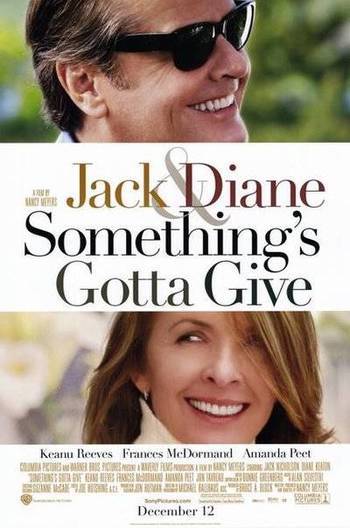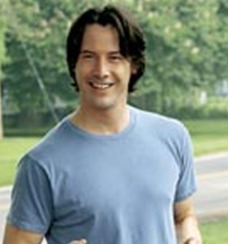
Something’s Gotta Give is one of my favorite romantic comedies of all time. It’s hilarious, pretty original in a lot of places, feautures one hell of a cast (Jack Nicholson, Diane Keaton, Keanu Reeves, Frances McDormand) and its script is available online for fellow romantic comedy/drama writers. If you are looking for a movie review, or need more (spoilerless) info on the plot, please check out my review post. You can also watch the trailer for a better picture.
This post will concentrate more on the main character Erica, a playwright, and the events that inspire and fuel her latest play (so let there be many spoiers!):
Playwright Whose Real Life Becomes More Interesting Than Fiction:
Erica Barry (Diane Keaoton) is a successful and prolific playwright in her 50s. She’s divorced; her ex-husband is her director – he still directs her plays. She has a 20-something, pretty auctioneer daughter and a sassy, college professor sister (Frances Mc Dormand).
When Erica comes to her house in the Hamptons with her sister to work on her new play, the two women get a huge surprise in the form of 60-something Harry Sanborn (Jack Nicholson) – who happens to a famous businessman/bachelor –who’s dating Erin.
After the initial shock, they decide to stay together in the house, though Harry can’t wait to get out of there. After all, Erica hates his guts. But when he has a heart attack before he can have sex with her daughter, the women rush him to the hospital, and there they meet a young, polite and eye candy of a doctor named Julian (Keanu Reeves). To their shock, he turns out to be a big fan of Erica’ plays and is smitten.

In an ideal world, they would send Harry packing, but he’s neither willing to stay in the hospital, nor is he well enough to go back to the city. So Julian recommends Harry stays closeby, where he can check in on him. So he ends up staying with Erica despite her objections. To make things more frustrating, everybody leaves for the city too, and Erica ends up staying in the same house with Harry, all by herself.
But as she gets to know him, she realizes he’s fun, smart, and quite charming when he wants to be. Despite going on a date with Julian and having a good time, as she and Harry get close, she forgets all about Julian, eventually sleeping with, and falling for Harry.
Harry is shocked by how much he is into Erica, but he isn’t sure if it is all because of his heart attack. After all, he is used to dating much younger women.
When he gets better, he pretty much leaves things undetermined. But when Erica sees Harry on a date with a young woman, she loses it. After dealing with her, Harry has to go to hospital again, which Erica doesn’t know about.
Back in the Hamptons, she gets into a bouts of crying and writing, she finishes her play. She also starts dating Julian (the young doctor) thanks to a chance encounter with her sister Zoe.
Harry seems to be doing OK, on a date with another young woman, when he almost chokes on his food: she’s an actress auditoning for a hilarious part in a play – which is pretty much all about Harry-Erica-Merin-Zoe, just with differently named characters.
When he goes to confront Erica, she seems happy and over him. She tells him the story isn’t exactly the same, until he sees the same scene from the hospital. Aren’t there any differences? There are: in the play, Henry is called Harry. And he dies. And that’s pretty much all Erica changed. She has even used bits of dialogue exchanged between them.
*
Yep, this is a romantic comedy, Harry is the male protagonist so you can guess he will eventually own up to the fact he’s head over heels with Erica and do something grand to win her back.
How Much Fiction Is Your Fiction, Really?
Many writers believe you need to live interesting and exciting lives to be able to write (well). And I mostly agree. Some of my stories were inspired while I was doing writing-worthy stuff in my life, like staying in gorgeous Santa Barbara for a month, or learning about the true potential of Public Relations from a great teacher.
And while I might not have written a certain event in my life, changed a couple of things and labeled it as fiction, I use a lot of real events in my blog posts. After all, what fun would dating blogging be if we couldn’t dis exes (while keeping names private, obviously) publicly?
In all seriousness, though, where do you, or should you draw the line? Where does your story stop being your own? Is it OK to write a play about your life, without notifiying other parties involved?
And while Harry might have deserved some humiliation, did he really deserve to die in a play about him?
Frankly, I think what Erica did to Julian was much worse than what Harry did to her. She went on a date with him, forgot all about their next date after confirming it, didn’t call to apologize, hooked up with Harry after professing her disdain of him, got back with Julian and ditched him for Harry on her birthday (OK, Julian left her saying she still loved Harry, which was the truth, but still…)So if I were Meyers, I would probably have an alternate ending or an additional scene where Julian wrote a play about Erica and killed her at the end.
*
When you use things from your life in your writing, where do you draw the line?
For more writer characters, check out my Writer Characters category.
Good question, Pinar. It’s a really hard one. I think nearly all writers must draw from their own lives, otherwise where would the adage, ‘write what you know’ come from? And yet, it’s a little bit like diary-writing, it helps at the time but it’s personal and who wants the rest of the world to see their diary? I try and use the things I’ve learned along the way and borrow ‘bits & pieces’ of the people around me without putting them in my stories ‘wholesale’, if you know what I mean!
I have no limitation as I write, so with this question I would write the story as she did, without even questioning the ramifications of publishing, or producing.
That said: Once the novel was complete I may edit, and alter, and bury, because I’m not a social monster or a psychopath who doesn’t feel responsibility for his actions or empathy for others feelings.
Delving into the second would slaughter the first (the novel) and you might as well not write it at all.
She didn’t only write it though. She staged the whole thing for the world to see 😀 But it’s an awesome movie regardless. I’m just saying if we were to justify what she did, Julian should start writing about her mistreating him. 😀
“So if I were Meyers, I would probably have an alternate ending or an additional scene where Julian wrote a play about Erica and killed her at the end.”
Solid gold! 😀
:):)